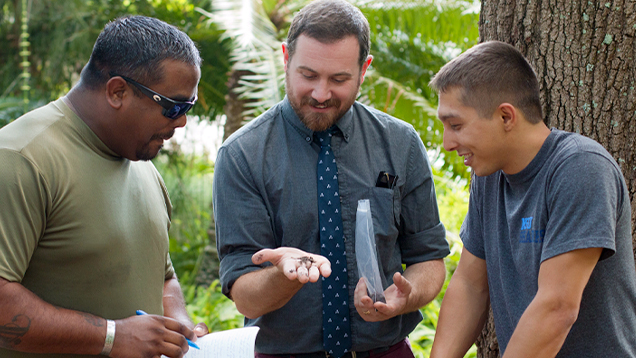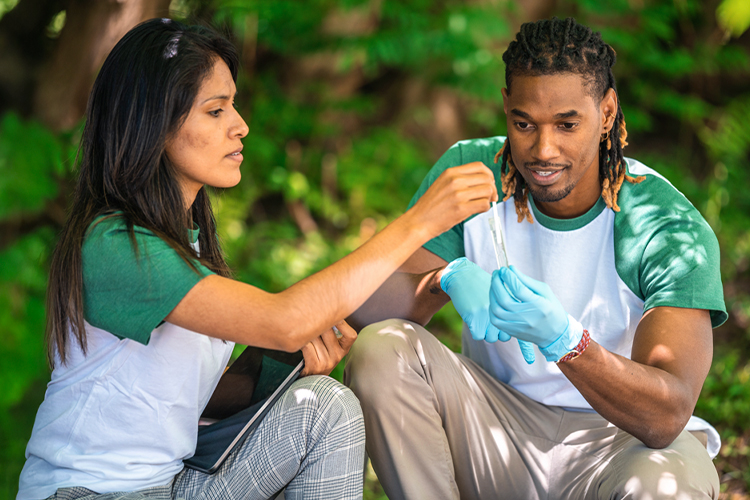The urgency of environmental change demands solutions grounded in both scientific
understanding and societal action. Our Bachelor's in Environmental Science curriculum
equips you to tackle this critical intersection. Explore the intricate workings of
Earth's systems and delve into the human dimensions of environmental challenges. Discover
how to forge a sustainable path forward, addressing questions of resource management
and societal well-being.
Core Courses (56 credits)
(
BIOL 1500
Biology I/Lab
/Credits: 4)
(
BIOL 1510
Biology II/Lab
/Credits: 4)
(
BIOL 36200
General Ecology/Lab
/Credits: 4)
(CHEM 1300 or CHEM 1300H
General Chemistry I/Lab or General Chemistry I/Lab Honors
/Credits: 4)
(CHEM 1310 or CHEM 1310H
General Chemistry II/Lab or General Chemistry II/Lab Honors
/Credits: 4)
(
ENVS 1200
Environmental Science
/Credits: 3)
(
ENVS 1500
Natural History of South Florida
/Credits: 4)
(
ENVS 2200
Introduction to Geology
/Credits: 4)
(
ENVS 2100
Environmental Science Lab
/Credits: 3)
(
ENVS 3000
Environmental Geology/Lab
/Credits: 4)
(
ENVS 3170
Everglades Ecology and Conservation
/Credits: 3)
(
ENVS 4950
Internship in Environmental Sciences
/Credits: 3)
(
GEOG 3000
Geography of Ecotourism
/Credits: 3)
(
LGST 3350
Environmental Law and Policy
/Credits: 3)
(
MATH 2020
Applied Statistics
/Credits: 3)
(
PHIL 3360
Environmental Ethics
/Credits: 3)
Select at least 22 credits from the following courses
(
CHEM 1300 or CHEM 1300H
General Chemistry I/Lab or General Chemistry I/Lab Honors
/Credits: 3)
(
BIOL 3311
Vertebrate Zoology/Lab
/Credits: 4)
(
BIOL 3600
Genetics/Lab
/Credits: 4)
(
BIOL 4010
Evolution
/Credits: 3)
(
BIOL 4340
Cellular and Molecular Biology
/Credits: 3)
(
CHEM 2400
Organic Chemistry I/Lab
/Credits: 4)
(
CHEM 2410
Organic Chemistry II/Lab
/Credits: 3)
(
CHEM 3150
Environmental Chemistry
/Credits: 3)
(
CHEM 3650
Biochemistry/Lab
/Credits: 3)
(
ENVS 2000 and ENVS 2001
Biodiversity of Alaskan Ecosystems and Biodiversity of Alaskan Ecosystems Field Course
/Credits: 4)
(
ENVS 3100
Environmental Issues
/Credits: 3)
(
ENVS 4900
Special Topics in Environmental Science
/Credits: 3)
(
ENVS 4990
Independent Study in Environmental Science
/Credits: (1–3 credits))
(
GEOG 2050
Survey of Geography
/Credits: 3)
(
GEOG 2075
Geographical Information Systems
/Credits: 3)
(
GEOG 2260
Geography of Natural Resources
/Credits: 3)
(
MATH 2100
Calculus I
/Credits: 4)
(
MATH 2200
Calculus II
/Credits: 4)
(
MBIO 2410
Marine Biology/Lab
/Credits: 4)
(
MBIO 2500
Oceanography/Lab
/Credits: 4)
(
MBIO 3450
Survey of Marine Mammals
/Credits: 3)
(
MBIO 3500
Food Web Dynamics
/Credits: 3)
(
MBIO 3600
Plankton Ecology
/Credits: 3)
(
MBIO 3700
Biology of Fishes/Lab
/Credits: 3)
(
MBIO 4260 and MBIO 4261
Ecology of the Galapagos Islands and Ecology of the Galapagos Islands Field Trip
/Credits: 4)
(
PHYS 2350
General Physics I/Lab
/Credits: 4)
(
SCIE 3210
History of Science
/Credits: 3)
(
SCIE 4490
Research Methods
/Credits: 3)
(
SOCL 3600
Environmental Sociology
/Credits: 3)
Select 9 credits from any courses offered at NSU
(ANY
ANY COURSE
/Credits: 9)
The academic program and curriculum requirements listed on this page are from the NSU Undergraduate Student Catalog. Students are bound by policies and curricula published in the catalog in effect
the semester they enter the university, unless an agreement is made with appropriate
NSU administration officials allowing them to abide by policies published in a later
catalog.


